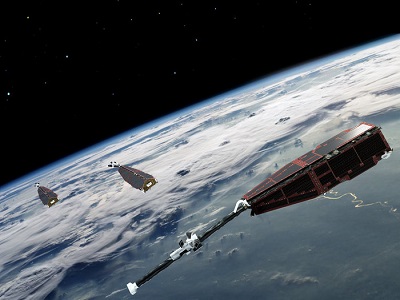- Activities
- Swarm Ion Temperature Estimati...
Swarm Ion Temperature Estimation
Overview
Ion temperature is one of the key parameters that provides insight into the thermal balance of the coupled ionosphere-thermosphere system. Together with the temperatures of neutral and electron gases, it controls various physical and chemical processes in the upper atmosphere. These include the ion-neutral collision frequencies, chemical reaction rates and plasma scale height, all of which affect the variation and distribution of the electron density.
The Swarm satellites carry out continuous measurements of ionospheric electron temperatures and densities using the Langmuir probes (LP) which are part of the electric field instrument (EFI). Ion temperature measurements, however, are not currently available. The main objective of this project is to estimate ion temperatures along the orbits of Swarm satellites using available LP electron density and temperature measurements, and numerical models. To accomplish this task, it is planned to develop a physics-based, data-driven model of the ion temperature along the orbits of the Swarm satellites from equator to high latitudes, evaluate the validity of the model under different geophysical conditions, and validate estimated ion temperatures against independent measurements. This new data product, which will be available to the scientific community, is expected to enhance the ability of the Swarm mission to provide more complete information about the ionospheric plasma, and thus, will enhance the overall scientific return of the mission.
Documentation
Download project documents:
- Swarm SITE product description
- Swarm SITE processing algorithm description
- Swarm SITE validation report
- Swarm SITE input data and model validation report
For the most up-to-date and essential information on the project validation, please refer to the 2021 AGU Earth and Space Science article:"Estimation of Ion Temperature in the Upper Ionosphere Along the Swarm Satellite Orbits" by Lomidze, Burchill, Knudsen, and Huba.
More information about SITE project
Project duration: January 2020 – April 2021. This project is funded by ESA via the Swarm DISC, Sub-Contract No. SW-CO-DTU-GS-123.
